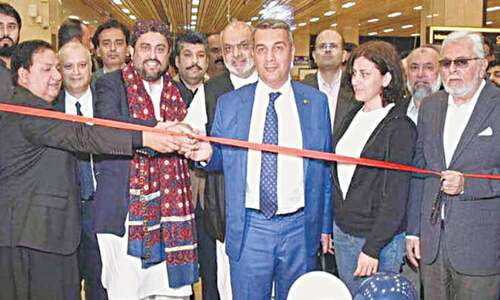KARACHI: A panel of three eminent journalists expressed their views on the state of denial in Pakistan at an event titled ‘Pakistani denialism: state, media, society’ moderated by Dr Nauman Naqvi in the Habib University auditorium on Friday evening.
Journalist Nazish Brohi said denialism had been institutionalised in the country. It could be seen in the state emblem of Pakistan which had a shield and a wreath around it. The shield represented four pillars of the economy even though two of them were not produced by the country, whereas the wreath signified our Mughal past, which actually did not feature in Mughal art.
After developing the argument for the denial on a large, state-level, scale, she raised the question as to where it was stemming from. She touched upon the recent Peshawar tragedy saying that despite the fact that Taliban claimed responsibility for it, there were people suggesting it was perpetrated by Jews or Indians. She said we’re told that religion was our history, our culture and because we strayed from the righteous path catastrophes befell us. In that regard she gave the examples of the 2005 earthquake which some said happened because girls had started wearing jeans and the 2011 floods which some believed came as a result of fahashi (vulgarity). She wound up her 10-minute address stating she’d prefer Waqar Ahmed’s water kit to the emblem of the state.
Columnist Wusutullah Khan employed humour and irony to put his message across. He said denial was a good thing because it’s convenient to call Germans the martial race and create Nazism; it’s convenient to say that before Mohammad bin Qasim’s arrival in India the subcontinent was enveloped in darkness and we were the ones who illuminated it; it’s easy for Golda Meir to say ‘who are Palestinians’ and advocate that Zionists weren’t committing excesses. He said for some groups denialism was a blessing, a kind of psychological defence mechanism, and coined a term for it in Urdu inkaariat.
Expanding on the point of collective denialism, the columnist pointed out a few of its tools or weapons. The first was to distort reality by mixing half a lie with half a truth. The second was coming up with conspiracy theories, always blaming others for our misdeeds. The third was what he called ‘cherry picking’ which he described as picking arguments that suited us most. And finally pressure or threats which silenced people making the deniers claim that since others were silent their standpoint was validated. On the issue of escaping the sense of defeatism, he said we never accept defeat but assert it’s a ‘tactical retreat’.
Writer Mohammed Hanif said as a society we’re in a state of denial with ourselves. He cited the example of a smoker who went to a doctor for a check-up and instead of telling him the truth that he smoked two packs a day, he lied it was five cigarettes a day and came back home feeling satisfied.
Discussing the gravity of the situation, the writer mentioned that not a single day passed when a doctor was not killed in this country, and invariably that doctor happened to be Shia. He said in the past three to four years Baloch and Sindhi men were picked up by intelligence agencies and when after a while pictures of their bodies were shown to the people some of them argued ‘they must’ve done something’. He hinted at ‘our own complicity’ in this [situation]. He said the people who didn’t deny were the Taliban; they owned up to things, which was their appeal. “We need to protect them from themselves,” he commented.
After the speeches the floor was opened for a question-and-answer session.
Published in Dawn, January 24th, 2015
On a mobile phone? Get the Dawn Mobile App: Apple Store | Google Play















































